|
|
|
Sort Order |
|
|
|
Items / Page
|
|
|
|
|
|
|
| Srl | Item |
| 1 |
ID:
136607
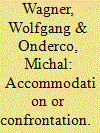

|
|
|
|
|
| Summary/Abstract |
Even though democracies by and large share the perception of Iran as a threat to peace and security, they disagree over the appropriate policy response. This paper examines why some democracies prefer accommodation while others plead for confrontation. Using a new data set on democracies' policies toward Iran in the 2000s, we assess the impact of power positions, commercial interests, and domestic political cultures while controlling for government ideology. While we find little support for any impact of power positions, “cultures of dealing with deviance,” that is, the discourses and practices of dealing with violations of norms domestically as institutionalized in a society's criminal law and justice system, have a substantial and statistically significant effect on state policies. Finally, we find qualified support for commercial liberalism: Whereas high levels of total trade do not have the expected effect of making states more accommodationist, high levels of trade in strategic goods such as oil do.
|
|
|
|
|
|
|
|
|
|
|
|
|
|
|
|
| 2 |
ID:
127752
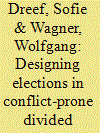

|
|
|
|
|
| Publication |
Frankfurt, Peace Research Institute frankfurt, 2013.
|
| Description |
37p.Pbk
|
| Series |
PRIF Report no.122
|
| Standard Number |
9783942532570
|
|
|
|
|
|
|
|
|
|
|
|
Copies: C:1/I:0,R:0,Q:0
Circulation
| Accession# | Call# | Current Location | Status | Policy | Location |
| 057578 | 324.609629/DRE 057578 | Main | On Shelf | General | |
|
|
|
|
| 3 |
ID:
137626
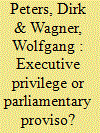

|
|
|
|
|
| Summary/Abstract |
Parliamentary oversight of the military constitutes an important element of the civilian control of the armed forces. However, the strength of parliaments in this realm varies greatly across democracies and little is known about the sources of this variation. We propose an explanation for one key aspect of this variation: why does parliament enjoy veto power over military deployments in some democracies but not in others? Our analysis of data from forty-nine democracies around the world suggests that at least three factors account for parliamentary strength or weakness in this realm: the external threat to which a country is exposed, its constitutional tradition, and the experience of severe military failure in the past.
|
|
|
|
|
|
|
|
|
|
|
|
|
|
|
|
| 4 |
ID:
114978


|
|
|
|
|
| Publication |
2011.
|
| Summary/Abstract |
Over the last two decades, there has been a 'democratic turn' in peace and conflict research, that is, the peculiar impact of democratic politics on a wide range of security issues has attracted more and more attention. Many of these studies are inspired by Immanuel Kant's famous essay on 'Perpetual Peace'. In this article, we present a critical discussion of the 'democratic distinctiveness programme' that emerged from the Democratic Peace debate and soon spread to cover a wider range of foreign policy issues. The bulk of this research has to date been based on an overly optimistic reading of a 'Kantian peace'. In particular, the manifold forms of violence that democracies have exerted, have been treated either as a challenge to the Democratic Peace proposition or as an undemocratic contaminant and pre-democratic relict. In contrast, we argue that forms of 'democratic violence' should no longer be kept at arm's length from the democratic distinctiveness programme but instead should be elevated to a main field of study. While we acknowledge the benefits of this expanding research programme, we also address a number of normative pitfalls implied in this scholarship such as lending legitimacy to highly questionable foreign policy practices by Western democracies. We conclude with suggestions for a more self-reflexive and 'critical' research agenda of a 'democratically turned' peace and conflict studies, inspired by the Frankfurt school tradition.
|
|
|
|
|
|
|
|
|
|
|
|
|
|
|
|
| 5 |
ID:
134062
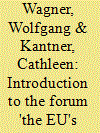

|
|
|
|
|
| Publication |
2014.
|
| Summary/Abstract |
The democratic control and legitimacy of the Common Security and Defence Policy (CSDP) has received growing attention. However, thus far, studies have mostly focused on 'blue prints', i.e., the analysis of formal powers of formal institutions, especially the European Parliament. These studies leave two desiderata that the contributions to this forum aim at overcoming: Firstly, in-depth case studies are required on how formal institutions make actual use of their formal powers in CSDP. Secondly, an examination of the 'sociocultural infrastructure' in which formal institutions and decision-making processes are embedded is required. The contributions to this forum redress both deficits. First, the actual practices of parliamentary involvement in the case of the EU's first maritime mission 'Atalanta' are examined. Second, the most important dimensions of the 'sociocultural infrastructure' are empirically studied, namely public opinion, the public sphere and civil society.
|
|
|
|
|
|
|
|
|
|
|
|
|
|
|
|
| 6 |
ID:
114432
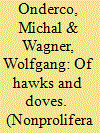

|
|
|
|
|
| Publication |
2012.
|
| Summary/Abstract |
The policies toward countries aspiring to acquire nuclear weapons continue to be heavily contested, differing even among countries that consider nuclear proliferation as one of the main threats to international security. This article maps the actual policies of liberal democracies toward Iran and North Korea along a continuum from confrontation to accommodation. Using data from an expert survey, the authors outline four main findings. First, policies toward both Iran and North Korea have become increasingly confrontational over time. Second, no policy convergence was observed among the states studied; that is, notwithstanding the adoption of joint sanctions, differences remained between states preferring confrontation and those opting for accommodation. Third, states maintained remarkably stable policy profiles over time. Finally, despite obvious differences between the norm violations of North Korea and Iran, states generally followed remarkably similar policies toward both countries. The authors' findings indicate that states exhibit stable preferences for either confrontation or accommodation toward nuclear aspirants. Although a comprehensive examination of the causes of these policy differences is beyond the scope of this article, the authors present evidence that a major cleavage exists between members and non-members of the Non-Aligned Movement, indicating that the degree to which nuclear aspirants' sovereignty should be respected is a main issue of contention.
|
|
|
|
|
|
|
|
|
|
|
|
|
|
|
|
| 7 |
ID:
134065
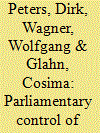

|
|
|
|
|
| Publication |
2014.
|
| Summary/Abstract |
Parliamentary involvement remains a key tool for the democratic control of executive policies. This article explores the web of parliamentary involvement in decision-making on European Union (EU) military operations, using insights gained in an in-depth case study on the EU's anti-piracy mission Atalanta. We find that parliaments at all levels became involved only after key political decisions had already been made. At the member state level, we find highly uneven involvement with only some parliaments being very well informed and closely monitoring, if not influencing government policy. The European Parliament became active only after the launch of the mission but then scrutinised it intensely, profiting (in contrast to national parliaments) from its access to top military officials and key decision-makers. Finally, transnational parliamentary assemblies as well as more informal networks provided opportunities to transmit information across the boundaries of individual parliaments and party-groups thus potentially enhancing the ability of parliamentarians to scrutinise government policies.
|
|
|
|
|
|
|
|
|
|
|
|
|
|
|
|
| 8 |
ID:
180562


|
|
|
|
|
| Summary/Abstract |
The USA is one of the “geopolitical others” of the European Union. Different geopolitical worldviews and normative commitments, therefore, often clash when relations with the USA are at stake. Whereas most analyses focus on differences between EU member states and their foreign policy traditions, this paper examines to what extent and in what way politicisation is driven by party politics by studying roll call votes in the European Parliament (EP) between 2004 and 2019. We find evidence that transatlantic relations have become more politicised. We show that voting behaviour is influenced first and foremost by MEPs’ affiliation with one of the political groups, not by their nationality. Furthermore, we demonstrate that support for the USA follows a bell-curve where centrist political groups are most supportive of the USA and political groups at the far ends of the left/right spectrum are most critical. Policies towards the USA are also related to the “new politics” dimension that pits cosmopolitans against nationalists, but the correlation is weaker than the one with the traditional left/right dimension. We examine the arguments brought forward in support for political groups’ voting behaviour by analysing the parliamentary debates preceding key votes on EU-US relations.
|
|
|
|
|
|
|
|
|
|
|
|
|
|
|
|
| 9 |
ID:
148302


|
|
|
|
|
| Summary/Abstract |
A striking difference between the EU’s 2016 Global Strategy and its 2003 predecessor is the ubiquity of resilience as a new leitmotif, understood as the ability of states and societies to reform, thus withstanding and recovering from internal and external crisis. Resilience provides a middle ground between over-ambitious liberal peace-building and under-ambitious stability, (re)directs attention to local resources and practices, and is ambiguous enough to be acceptable to everyone. The Global Strategy’s leitmotif is an example of the rise and spread of resilience in international discourses about crisis management and humanitarian emergencies. Although there are risks inherent to the way in which resilience reframes risks and crises, its added value lies in its power as convening concept, opening up international organizations to new ways of thinking and working, and providing a common ground for engagement.
|
|
|
|
|
|
|
|
|
|
|
|
|
|
|
|
| 10 |
ID:
161269


|
|
|
|
|
| Summary/Abstract |
The individualisation of punishment is a key element in liberal narratives about international law and international relations. This narrative has become an integral part of positive international law, especially the regimes governing the use of force and the prosecution of an international crimes. Rather than punishing states or entire societies, liberals claim, punishment has become restricted to those who incurred individual guilt. To liberals, the individualisation of punishment is part of a larger process of enlightenment and civilisation that has helped to fence atavisms like revenge. We do not question the emergence of an ever more sophisticated system of individual punishment in international law. However, we argue that punitivity has been more difficult to fully channel towards individuals and away from collectives than claimed. To be sure, punitive language has by and large been banned from the laws of armed conflict. We argue, however, that the absence of a punitive vocabulary does not equal the absence of punitivity. In contrast, current state practices of using armed force are still imbued with punitivity, however silenced in the current legal framework and thus pushed underground. Realising the presence of a punitive undercurrent, we argue, adds to a more comprehensive understanding of contemporary state practices.
|
|
|
|
|
|
|
|
|
|
|
|
|
|
|
|
| 11 |
ID:
080509


|
|
|
|
|
| Publication |
2007.
|
| Summary/Abstract |
The creation of the Single European Market has been accompanied by an intense discussion on whether market-creating measures have been privileged over market-correcting ones by the institutional system of the EU. The creation of an 'Area of Freedom, Security and Justice' (AFSJ) launched by the Treaty of Amsterdam poses a similar question which, however, has remained heavily under-researched: will the balance between policing competencies and individual rights shift towards the former at the expense of the latter? Recent work on the 'new raison d'état' and the strengthening of national executives in processes of Europeanisation points in this direction. This essay explores the parallels between the Common Market and the AFSJ with regard to the relationship between the structures and substance of governance. The balance between security and individual rights is scrutinised in the main pillars of the AFSJ: asylum cooperation, judicial cooperation in criminal matters and police cooperation
|
|
|
|
|
|
|
|
|
|
|
|
|
|
|
|
|
|
|
|
|